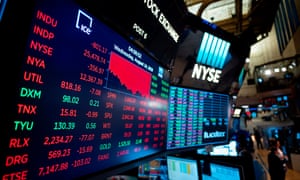
Reuters: So far, markets have been comparatively sanguine in response to Trump’s diagnosis: hopes of a breakthrough in talks among US lawmakers on another stimulus package took the edge off a stock market selloff on Friday, with the S&P 500 losing less than 1% and so-called safe-haven assets seeing limited demand. News of Trump’s hospitalisation at a military medical center outside Washington, where he remained on Saturday, came after trading ended on Friday.
Many investors are concerned, however, that a serious decline in Trump’s health less than a month before Americans go to the polls could roil a US stock market that recently notched its worst monthly performance since its selloff in March while causing turbulence in other assets.
If the president’s health is in jeopardy, there’s “too much uncertainty in the situation for the markets just to shrug it off,” said Willie Delwiche, investment strategist at Baird.

The various outcomes investors currently envision run the gamut from a quick recovery that bolsters Trump’s image as a fighter to a drawn-out illness or death stoking uncertainty and drying up risk appetite across markets.
Should uncertainty persist, technology and momentum stocks that have led this year’s rally may be particularly vulnerable to a selloff, some investors said. The tech-heavy Nasdaq fell more than 2% on Friday, double the S&P 500’s decline.
“If people … get nervous right now, probably it manifests itself in crowded trades like tech and mega-cap being unwound a bit,” Delwiche said.
A record 80% of fund managers surveyed last month by BofA Global Research said that buying technology stocks was the market’s “most crowded” trade.
The concentration of investors in big tech stocks has also raised concerns over their outsized sway on moves in the broader market.
The largest five U.S. companies – Google parent Alphabet , Amazon, Apple, Facebook, and Microsoft – now account for almost 25% of the S&P 500’s market capitalization, according to research firm Oxford Economics.


